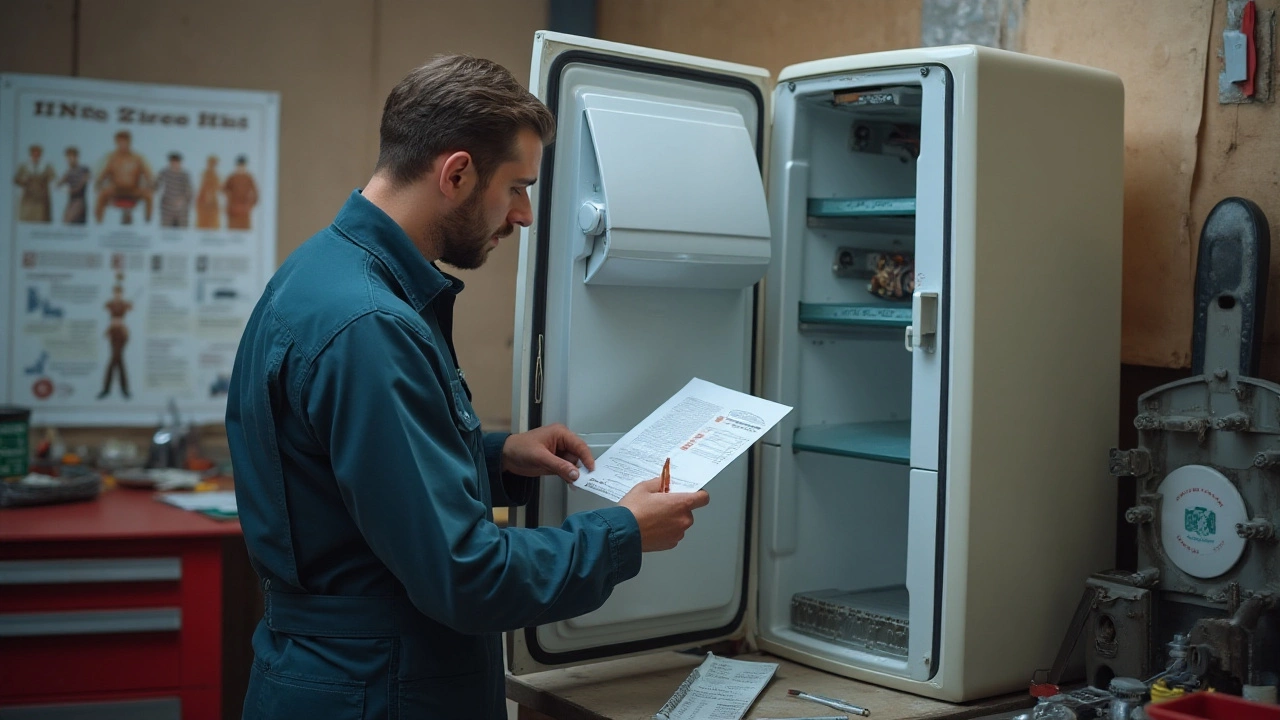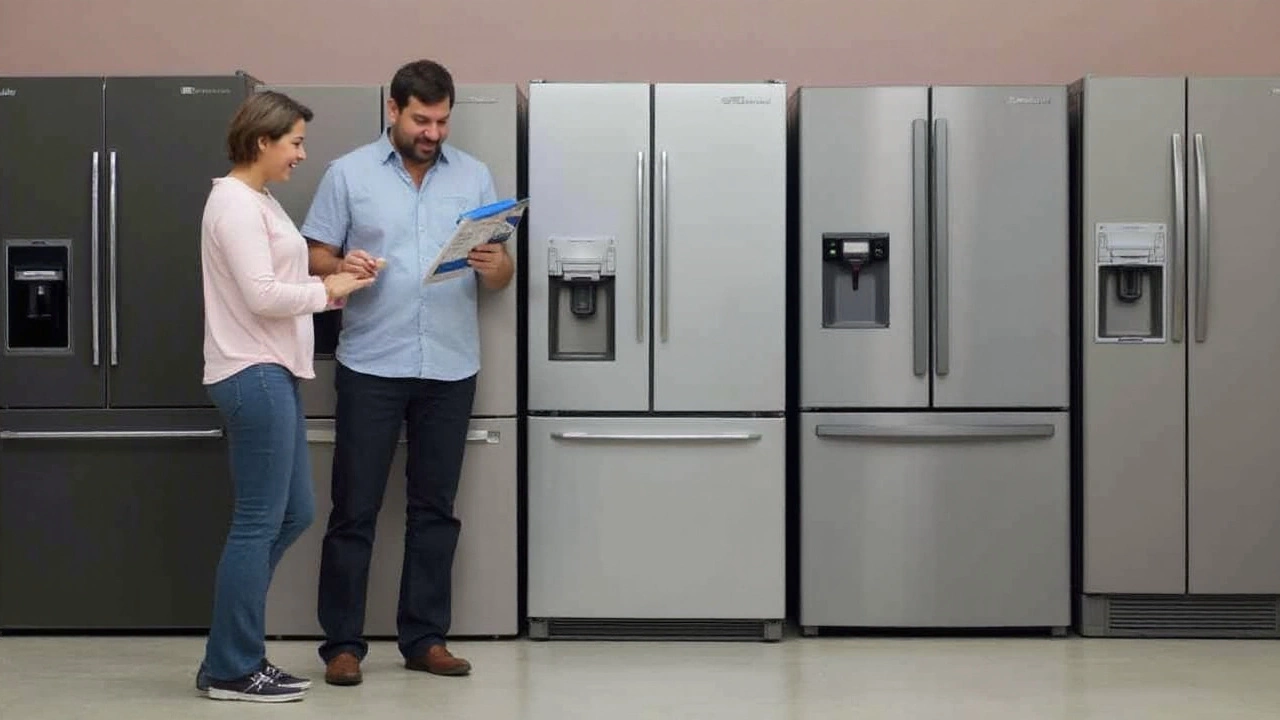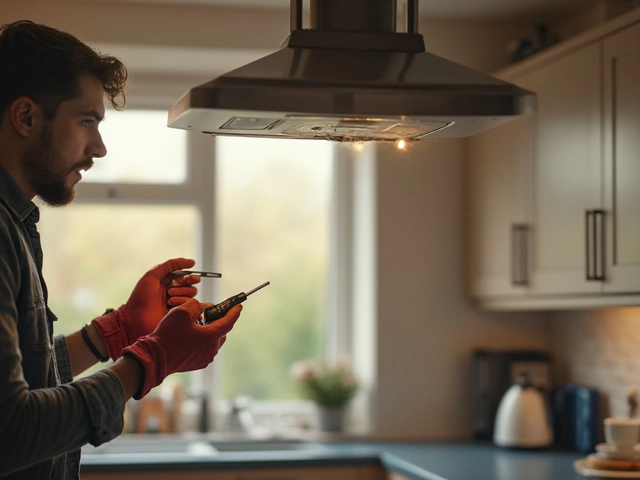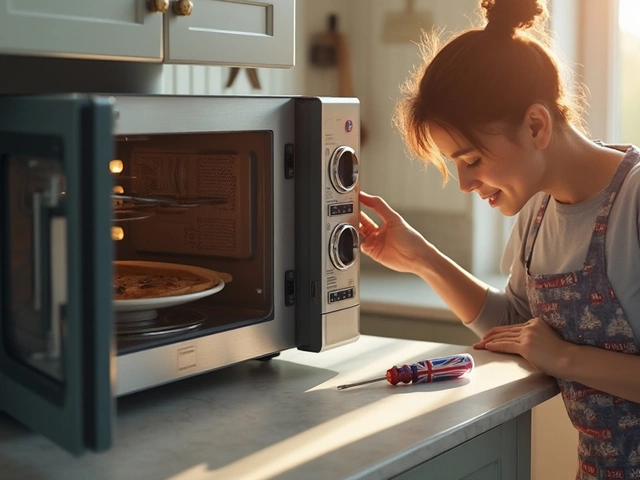When it comes to household appliances, the refrigerator stands as one of the unsung heroes of the kitchen. It quietly keeps your food fresh and your drinks cold, working tirelessly day and night. But like all things, refrigerators don’t last forever. Understanding how long you can expect your refrigerator to last and what you can do to ensure it reaches its full potential is key to both saving money and reducing waste.
Typically, a refrigerator's lifespan ranges between 10 to 20 years. Several factors such as usage habits, maintenance routines, and technological advancements can heavily influence these numbers. As our homes become more tech-savvy, newer models come equipped with features that both prolong and predict their functional lifespan.
But what can you do to make sure your fridge doesn’t reach its expiration date ahead of time? From routine cleaning to understanding the tell-tale signs of a fridge on the fritz, the path to an enduring kitchen companion lies in thoughtful care and informed decisions. Dive into this guide to uncover valuable tips and tricks that will keep your refrigerator running smoothly and efficiently.
- Typical Lifespan of a Refrigerator
- Factors Influencing Refrigerator Longevity
- Signs Your Fridge Needs Repair
- Basic Maintenance Tips for Longevity
- Technological Advances Impacting Durability
- When to Repair vs. When to Replace
Typical Lifespan of a Refrigerator
The typical lifespan of a refrigerator is a topic that intrigues many homeowners. Most modern fridges are designed to last between 10 to 20 years, with the average being around 14 years. This range, however, can be influenced by several factors, including the make and model of the refrigerator, how well it is maintained, and whether it's under constant use. Older models often have a shorter life expectancy due to less advanced technology and energy efficiency compared to newer appliances. On the other hand, today's models are built with more durable materials and advanced mechanics that are meant to withstand the test of time.
From basic top-freezer models to the more elaborate French-door designs, each type of refrigerator comes with its own set of characteristics that can affect its longevity. For instance, a well-cared-for top-freezer model might outlast a poorly maintained side-by-side refrigerator. It’s also worth noting that smaller, compact units generally have a shorter lifespan compared to their full-sized counterparts. Regular maintenance, including cleaning coils and ensuring door seals are tight, plays a critical role in how long these appliances keep your food fresh and cool.
In a report by Consumer Reports, it was highlighted that "choosing a fridge with an Energy Star label not only can save money on energy bills but also can operate more efficiently, often resulting in a longer lifespan." It underscores the importance of making informed choices when purchasing a new fridge, considering not just the initial cost but the long-term value and durability.
"A refrigerator that is serviced regularly can outlive its expected lifespan by several years," says Alex Truman, a renowned appliance technician.
Another interesting factor to consider is technological advances. As technology evolves, so does the quality and features of household appliances. Modern refrigerators now often include smart technology, which can automatically adjust internal temperatures and even alert you when maintenance is required. This not only enhances their usability but can potentially extend their lifespan if used correctly.
It's worth keeping in mind that while technology can extend the lifespan of a refrigerator, the basic principles of appliance care remain the same. Proper maintenance is key. Ensuring that vents are clear, the temperature settings are optimal, and the fridge is filled to a productive level are all actions that homeowners can take to increase the longevity of their appliances. For those keen on stretching the life of their refrigerator, creating a routine maintenance checklist can be an invaluable tool for years of reliable service.
Factors Influencing Refrigerator Longevity
The lifespan of a refrigerator is not just a matter of ticking time but a tapestry woven from many threads, each influencing how long your refrigerator will keep humming in your home. A primary factor is the brand and build quality. Not all refrigerators are created equal; some are built like tanks while others are lighter and less rugged. Brands that focus on durability often incorporate high-quality materials and components that withstand wear and tear over the years. Investing in a reputable brand might mean paying more upfront but can lead to fewer headaches in the long run.
Another significant factor is location and how the refrigerator is maintained. The environment where your fridge lives plays a vital role in its lifespan. Extremely hot or cold temperatures can strain its systems; refrigerators in garages may face such challenges. Keeping it indoors, in a well-ventilated spot away from heat sources, can significantly extend its life. Regular maintenance is equally crucial. A little effort, like cleaning the coils every six months and ensuring the seals are tight, can prevent larger issues down the line.
Usage patterns also chart the path of a refrigerator’s longevity. How often you open the door, for instance, affects its efficiency and wear. Frequent openings force the appliance to work harder to maintain a constant internal temperature. This is particularly true in households with children, where the fridge door might swing open countless times a day. Structuring mealtimes and encouraging organized shelf use can help minimize these effects, prolonging the refrigerator's life. Technologies incorporated into modern units, such as frost-free functions and adjustable thermostats, offer solutions for optimizing energy use, further impacting longevity.
At times, external factors that are beyond a consumer’s control, like power fluctuations and surges, also come into play. These can impact the refrigerator’s internal circuits and components, possibly leading to failure or reduced efficiency. Having a surge protector installed can act as a safeguard for electronics, adding a layer of protection for sensitive appliances. According to experts from the American Society of Heating, Refrigerating, and Air-Conditioning Engineers, "Maintaining stable power inputs is essential in extending the longevity of cooling appliances."
"Today's refrigerators are more energy-efficient than those from decades past," says the staff at the Energy Efficiency Hub, "but they require stable conditions to function optimally."
Interestingly, innovations in refrigeration technology present a double-edged sword. While they provide more convenience and efficiency, they also introduce complexities that might lead to more potential failure points. Smart refrigerators with integrated tech features can alert users to maintenance needs but might suffer from software glitches. It's ironic how advancing technology can sometimes hasten a refrigerator's failure if not perfectly executed or maintained. It's worthy to note that while traditional models may lack the bells and whistles, their simplicity contributes to their longevity.

Signs Your Fridge Needs Repair
Knowing when your refrigerator is on the brink of needing some professional TLC is crucial. A few simple checks can help you figure out if your trusty refrigerator is not doing its job as expected or is gearing up for a shutdown. Strange noises and out-of-the-ordinary behavior are usually the first signs that your fridge is screaming for help. You may start noticing loud buzzing, clunking, or whirring sounds that weren't there when you first got it. These sounds can indicate worn-out motors or compressors struggling to keep up.
Another tell-tale signal of a fridge in distress is when it struggles to maintain a consistent temperature. If your milk seems to be spoiling quicker than it should or your ice cream is a gooey mess instead of a creamy indulgence, there's probably something off with the cooling mechanism. Often, this inconsistency can boil down to issues with the thermostat or even the refrigerant levels. Regular temperature checks can be your kitchen's best friend here.
"When your refrigerator fails to keep the right temperature, it's often a sign that the door seals or internal parts need attention," says Bob Vila, a respected figure in home improvement.
You'll also want to be on the lookout for pools of water or condensation, not just inside the fridge but around it too. This suggests problems with the defrosting system or perhaps a blocked drainage tube. Repairing these issues early can help prevent further damage and maintain your appliance's health. It's worth checking the door gaskets as well because leaky or cracked seals can lead to these exact issues, taxing your entire system.
Of course, spikes in energy bills might be a silent but deadly assassin lurking in plain sight. If your energy costs are shooting through the roof, this could mean that your fridge is overcompensating for failures within its subsystems, causing it to guzzle more power than it should. Simple diagnostic tools or an appliance repairer’s eye may reveal that your fridge requires a compressor replacement or a fan motor adjustment to get back on an energy-friendly path.
Basic Maintenance Tips for Longevity
To keep a refrigerator running efficiently day in and day out, basic maintenance is crucial. Performing routine upkeep can drastically extend its lifespan. First and foremost, setting the right temperature is key. Ideally, the fridge should be set at around 37-40 degrees Fahrenheit, while the freezer should hover around 0 degrees. Maintaining these temperatures ensures that food stays fresh without overloading the compressor. Then there's the task of cleaning the condenser coils. These coils, typically located at the back or underneath the fridge, are prone to attracting dust and debris. A simple vacuum or coil brush treatment every six months can do wonders for appliance care and prevent overheating.
Another important tip is ensuring door seals are intact. Over time, seals can wear out, allowing cold air to escape and putting extra strain on the refrigerator. To check the seal, you can perform a simple test by closing the door on a paper. If it slides out easily, it might be time to replace the seal. This small maintenance job can lead to both prolonged lifespan and reduced energy bills. More so, occasionally emptying the fridge and inspecting it for leaks prevents minor issues from turning into major problems.
According to the U.S. Department of Energy, proper maintenance can improve refrigerator efficiency by 10 to 20%.
Proper organization inside the refrigerator also matters. Keeping items well spaced allows for better air circulation, which helps in maintaining consistent temperatures. Try grouping similar items together and don’t overcrowd the shelves. An organised fridge not only saves power but also makes finding your favorite snack that much easier. Equally important is defrosting older models that develop frost build-up. If you notice more than a quarter-inch of ice, a manual defrost could be necessary. This task takes a bit of time but is essential for ensuring the refrigerator's lifespan is not compromised by excessive ice affecting its cooling ability.
Another often overlooked maintenance tip is to keep an eye on unusual sounds. Listen for abnormal humming, clicking, or buzzing. These can indicate potential issues that, if caught early, may only require simple tweaks or minor parts replacement rather than expensive overhauls. Lastly, remember how vital power supply management is. In case of frequent fluctuations, using a surge protector can safeguard the appliance's sensitive components. Make these maintenance tasks part of your routine, and your fridge repair needs will likely be minimal, allowing you to enjoy seamless service from this kitchen stalwart for years.

Technological Advances Impacting Durability
The world of home appliances is no stranger to innovation, and refrigerator lifespan has benefited significantly from technological advances in recent years. Many modern refrigerators now boast features that were unimaginable just a few decades ago. These advances not only add convenience but also greatly enhance the durability and energy efficiency of the appliance.
One of the key technological improvements is the introduction of inverter compressors. Unlike traditional compressors which turn on and off frequently, causing wear and tear, inverter compressors run continuously, adjusting their speed to meet the cooling demand. This results in less energy consumption and a more balanced temperature inside the fridge, extending the appliance's life considerably. Another fascinating development is the use of digital sensors and smart thermostats. These sensors help in maintaining optimal temperature and humidity levels, ensuring that the interiors stay cool and your food stays fresh while reducing strain on the mechanical parts of the refrigerator.
Technological innovations also include the implementation of more eco-friendly refrigerants, which not only help in reducing the appliance's impact on the environment but also contribute to its longevity. These improved refrigerants work efficiently at lower pressures, which ensures less stress on the refrigerator's system. Moreover, advancements like frost-free technology and automatic defrost help in maintaining the appliance more independently, thereby requiring less manual intervention and servicing.
"The integration of smart technology in refrigerators is one of the most significant evolutions we've seen in the last decade. These appliances can now predict maintenance needs, potentially avoiding costly repairs," cites an expert from a leading appliance manufacturers journal.
Smart refrigerators are now equipped with Wi-Fi connectivity, allowing for remote monitoring and diagnostics. This technology provides the users insights on energy usage patterns and potential issues, often before they become serious problems. Machine learning algorithms embedded in these smart systems make predictive maintenance possible, ensuring that the refrigerator operates smoothly for as long as possible. Biodegradable materials and modular designs are also being incorporated to make repairs easier and prolong product life.
In summary, the continuous push for innovation in refrigerator technology is magical. We're witnessing the convergence of energy efficiency, sustainability, and high-tech solutions which directly affect the durability of our kitchen's central appliance. These advances not only help reduce the frequency of fridge repair but also ensure a fridge's longevity and reliability over time. As we move forward, we can expect even more impressive developments that will only further this trend, ensuring that the refrigerators of the future are more durable, efficient, and intelligent than those of today.
When to Repair vs. When to Replace
One of the most pressing questions a homeowner faces with any appliance breakdown is whether to repair the issue or to replace the item entirely. When it comes to fridges, this decision can impact your wallet and your day-to-day convenience. The first thing to consider is the age of your refrigerator. If your unit is nearing the end of its expected refrigerator lifespan—say, 10 to 20 years depending on the model and maintenance—replacement might often be the wiser choice. Older fridges may not have the energy efficiency of newer models, leading to higher electricity costs. In fact, refrigerators made after 2000 are about 40% more energy-efficient, which is something worth considering.
Next on the list is the nature and frequency of repairs. If breakdowns have become a regular occurrence, these repair costs can add up quickly, potentially surpassing the cost of a new unit. Ask yourself, how often are you calling the repairman? For minor issues such as a door gasket replacement or a rare thermostat malfunction, repair is usually the most cost-effective route.
"If the cost to repair your fridge is more than half the price of a new one, it’s time to replace," advises the experts at Consumer Reports, emphasizing the balance between cost and value.
Of course, budget constraints play a crucial role in this decision as well. Counterbalancing upfront costs with operational savings is a central factor. While it might be tempting to replace a fridge that simply isn't cooling as efficiently as it once did, evaluate its impact on your energy bills first. Moreover, many modern fridges come with warranties that cover certain parts and repairs for a limited time. Knowing the terms of these warranties can save you from unnecessary replacement expenses.
Finally, let's talk about environmental impact. Deciding whether to repair or replace also involves considering the ecological footprint of your choice. Repairing and prolonging the life of appliances can reduce environmental impact, but sticking with an old, energy-guzzling unit isn't always the greenest choice. Newer models often meet stricter energy standards, operating more efficiently and saving on power usage.
Information, planning, and a little bit of number crunching can illuminate the best path forward. Consider sitting down with your warranty information, recent energy bills, and a cost list of likely repairs. Then weigh these costs against the purchase price and the projected energy savings of a new model. This informed process should guide you smartly towards the best decision for your home, budget, and lifestyle.







